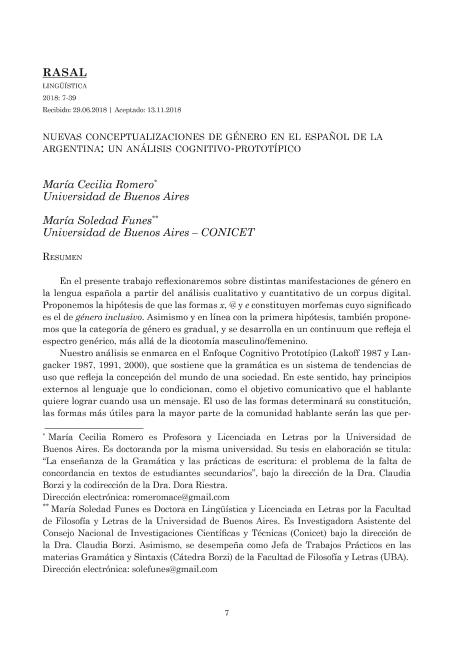Mostrar el registro sencillo del ítem
dc.contributor.author
Romero, María Cecilia

dc.contributor.author
Funes, María Soledad

dc.date.available
2021-04-20T04:04:54Z
dc.date.issued
2019-06
dc.identifier.citation
Romero, María Cecilia; Funes, María Soledad; Nuevas conceptualizaciones de género en el español de la Argentina: un análisis cognitivo-prototípico; Sociedad Argentina de Estudios Lingüísticos; Rasal Lingüística; 2018; 6-2019; 7-39
dc.identifier.issn
2250-7353
dc.identifier.uri
http://hdl.handle.net/11336/130431
dc.description.abstract
En el presente trabajo reflexionaremos sobre distintas manifestaciones de género en la lengua española a partir del análisis cualitativo y cuantitativo de un corpus digital. Proponemos la hipótesis de que las formas x, @ y e constituyen morfemas cuyo significado es el de género inclusivo. Asimismo y en línea con la primera hipótesis, también proponemos que la categoría de género es gradual, y se desarrolla en un continuum que refleja el espectro genérico, más allá de la dicotomía masculino/femenino. Nuestro análisis se enmarca en el Enfoque Cognitivo Prototípico (Lakoff 1987 y Langacker 1987, 1991, 2000), que sostiene que la gramática es un sistema de tendencias de uso que refleja la concepción del mundo de una sociedad. En este sentido, hay principios externos al lenguaje que lo condicionan, como el objetivo comunicativo que el hablante quiere lograr cuando usa un mensaje. El uso de las formas determinará su constitución, las formas más útiles para la mayor parte de la comunidad hablante serán las que perduren y la gramática emergerá del discurso como un conjunto de rutinas recurrentes más o menos gramaticalizadas constantemente renegociadas en el habla (Hopper 1988). La gramática en este marco se encuentra motivada y sujeta al cambio, porque el hablante usa la lengua en pos de un objetivo comunicativo puntual.
dc.description.abstract
In the present paper we will reflect on different manifestations of GENDER in the Spanish language from the qualitative and quantitative analysis of a digital corpus. We propose the hypothesis that the forms x, @ and e constitute morphemes whose meaning is that of inclusive gender. In relation with the first hypothesis, we also propose that the gender category is gradual, and develops in a continuum that reflects the generic spectrum, beyond the masculine / feminine dichotomy. Our analysis is based on a grammatical approach that allows us to analyze these forms as opposed to other approaches whose basic principles prevent it. The Prototypical Cognitive Approach (Lakoff 1987 & Langacker 2000) argues that grammar is a system of usage trends that reflects a society’s conception of the world. In this sense, there are principles external to the language that condition it, such as the communicative objective that the speaker wants to achieve when using a message. The use of the forms will determine their constitution, the most useful forms for most of the speaking community will be those that endure and grammar will emerge from discourse as a set of recurring routines more or less grammaticalized and constantly renegotiated in speech (Hooper 1988). The grammar in this frame will be motivated to change and subject to change because the speaker uses the language in pursuit of a specific communicative objective.
dc.format
application/pdf
dc.language.iso
spa
dc.publisher
Sociedad Argentina de Estudios Lingüísticos
dc.rights
info:eu-repo/semantics/openAccess
dc.rights.uri
https://creativecommons.org/licenses/by-nc/2.5/ar/
dc.subject
Enfoque Cognitivo Prototípico
dc.subject
Género
dc.subject
Lenguaje inclusivo
dc.subject
Morfema
dc.subject
Objetivo Comunicativo
dc.subject.classification
Lingüística

dc.subject.classification
Lengua y Literatura

dc.subject.classification
HUMANIDADES

dc.title
Nuevas conceptualizaciones de género en el español de la Argentina: un análisis cognitivo-prototípico
dc.type
info:eu-repo/semantics/article
dc.type
info:ar-repo/semantics/artículo
dc.type
info:eu-repo/semantics/publishedVersion
dc.date.updated
2021-04-06T18:47:40Z
dc.identifier.eissn
2618-3455
dc.journal.volume
2018
dc.journal.pagination
7-39
dc.journal.pais
Argentina

dc.journal.ciudad
Buenos Aires
dc.description.fil
Fil: Romero, María Cecilia. Universidad de Buenos Aires. Facultad de Filosofía y Letras; Argentina
dc.description.fil
Fil: Funes, María Soledad. Universidad de Buenos Aires. Facultad de Filosofía y Letras; Argentina. Consejo Nacional de Investigaciones Científicas y Técnicas; Argentina
dc.journal.title
Rasal Lingüística
dc.relation.alternativeid
info:eu-repo/semantics/altIdentifier/url/https://ppct.caicyt.gov.ar/index.php/rasal/article/view/15473
Archivos asociados
